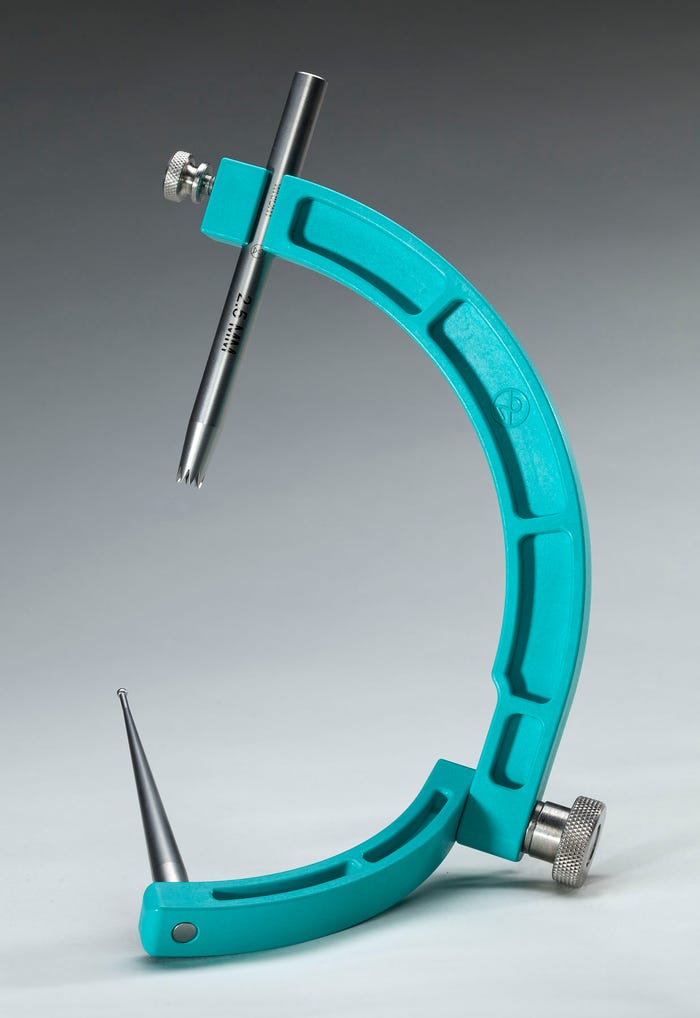Compound Delivers Metal-Like Performance to Disposable Surgical Tool
RTP met Wright Medical’s stiffness and cost requirements for a single-use polycarbonate drill guide
May 3, 2011
|
RTP suggested a fiber-reinforced polycarbonate compound for use in a retrograde drill guide. |
Designed to treat osseous defects, Pro-Dense bone-graft substitute is injected or packed into surgically created or trauma-induced bone voids to provide temporary support during the healing process. Seeking to increase the value of this product, manufacturer Wright Medical Technology Inc. (Arlington, TN) set its sights on developing a set of presterilized, single-use surgical tools, including a retrograde drill guide, for use with Pro-Dense in certain ankle procedures. By partnering with custom compounder RTP Co. (Winona, MN), Wright Medical was able to engineer a plastic retrograde drill guide that offered the stiffness of metal at a disposable price.
Offered as an optional part of Wright Medical's disposable extremity procedure kit, the retrograde drill guide is designed to facilitate guidewire placement during the surgical treatment of osseous defects. The inclusion of this part in the single-use surgical tool kit presented a significant challenge to the company's engineers, however. They were skeptical as to the feasibility of developing a single-use plastic drill guide--especially at a disposable price point. Drill guides, after all, have traditionally been fabricated from metal because of their high stiffness and dimensional accuracy requirements.
"We were prepared to manufacture metal drill guides, even though we realized that providing an incomplete disposable kit that needed a separate reusable piece was a less-than-elegant solution," recalls Ryan Belaney, Wright Medical product development engineer. Before moving forward with the inelegant metal solution, however, the company consulted RTP Co. Having worked with the custom compounder previously, Wright Medical had found the company to be an effective problem solver, according to Belaney.
And the company didn't disappoint. RTP presented two different 300-series glass-fiber-reinforced polycarbonate compounds as candidate materials to replace metal in the drill guide. The biocompatible, reinforced polycarbonate compounds boasted dimensional stability and were able to meet the product's stringent stiffness requirements.
"Stiffness is many times in the eye of the beholder," says Karl Hoppe, product development engineer at RTP. "While a specific flexural modulus requirement wasn't established, we trialed glass-fiber loadings that we felt would give both the fit and function without overcoming the dimensional stability offered by the polycarbonate." Wright Medical ultimately selected the higher-loaded polycarbonate option for maximum stiffness.
In addition to achieving the strength of metal in a single-use plastic tool, Wright Medical benefited from the cost of developing a disposable product. "We found that we would be able to manufacture plastic drill guides for less than half the cost of a metal version, handily meeting our desired price point for disposables," Belaney adds.
With RTP's assistance, Wright Medical was able to develop a value-enhancing, cost-effective disposable tool without sacrificing performance. "In many cases, the strength and stiffness properties of metals are overengineered for an application," Hoppe comments. "Proper selection of reinforced thermoplastics, along with careful part and tooling design, can achieve acceptable performance even though the metal is, in practice, stronger and stiffer. In the past, people used metals because they had to; today they have more options to consider."
You May Also Like


.png?width=300&auto=webp&quality=80&disable=upscale)
